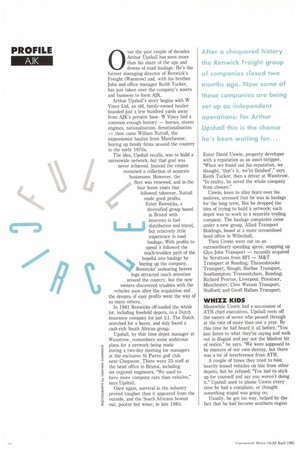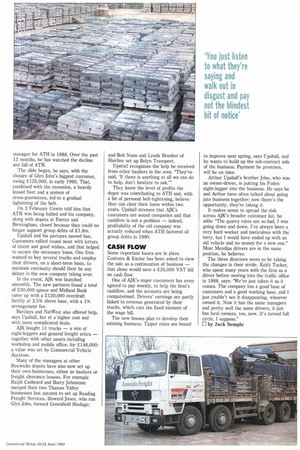O ver the past couple of decades Arthur Upshall has seen
Page 42

Page 43

If you've noticed an error in this article please click here to report it so we can fix it.
more than his share of the ups and downs of road haulage. He's the former managing director of Renwick's Freight (Wanstow) and, with his brother John and office manager Keith Tucker, has just taken over the company's assets and business to form AJK.
Arthur Upshall's story begins with W Viney Ltd, an old, family-owned haulier founded just a few hundred yards away from AJK's present base. W Viney had a common enough history — horses, steam engines, nationalisation, denationalisation — then came William Nuttall, the expansionist haulier from Manchester, buying up family firms around the country in the early 1970s.
The idea, Upshall recalls, was to build a nationwide network, but that goal was never achieved. Instead the empire remained a collection of separate businesses. However, the fleet was renewed, and in the four boom years that followed takeover, Nuttall made good profits.
Enter Renwicks, a diversified group based in Bristol with interests in fuel
Won'distribution and travel, but relatively little experience in road
haulage. With profits to spend it followed the much-trodden path of the hopeful into haulage by buying up the company. Renwicks' endearing beaver logo attracted much attention around the country, but the new owners discovered troubles with the vehicles soon after the acquisition and the dreams of easy profits went the way of so many others.
In 1981 Renwicks off-loaded the whole lot, including freehold depots, to a Dutch insurance company for just £1. The Dutch searched for a buyer, and duly found a cash-rich South African group.
Upshall, by that time depot manager at Wanstrow, remembers some ambitious plans for a network being made during a two-day meeting for managers at the exclusive St Pierre golf club near Chepstow. There were 25 staff at the head office in Bristol, including six regional engineers. "We used to have more company cars than vehicles," says Upshall.
Once again, survival in the industry proved tougher than it appeared from the outside, and the South Africans bowed out, poorer but wiser, in late 1985. Enter David Unwin, property developer with a reputation as an asset-stripper. "When we found out his reputation, we thought, 'that's it, we're finished'," says Keith Tucker, then a driver at Wanstrow. "In reality, he saved the whole company from closure."
Unwin, keen to allay fears' over his motives, stressed that he was in haulage for the long term. But he dropped the idea of trying to build a network; each depot was to work as a separate trading company. The haulage companies came under a new group, Allied Transport Holdings, based at a more streamlined head office in Willenhall.
Then Unwin went out on an
extraordinary spending spree, snapping up Glyn John Transport — recently acquired by Scruttons from BFI — M&T Transport at Reading; Thamesbrooke Transport, Slough; Harline Transport, Southampton; Transmitcham, Reading; Richard Proctor, Liverpool; Priestner, Manchester; Clive Watson Transport, Stafford; and Geoff Hallam Transport.
WHIZZ KIDS Meanwhile Unwin had a succession of ATH chief executives. Upshall reels off the names of seven who passed through at the rate of more than one a year. By this time he had heard it all before. "You just listen to what they're saying and walk out in disgust and pay not the blindest bit of notice," he says. "We were supposed to be masters of our own destiny, but there was a lot of interference from ATH.
A couple of times they tried to foist heavily leased vehicles on him from other depots, but he refused: "You had to stick up for yourself and say you weren't doing it." Upshall used to phone Unwin every time he had a complaint, or thought something stupid was going on.
Usually, he got his way, helped by the fact that he had become southern region manager for ATH in 1988. Over the past 12 months, he has watched the decline and fall of ATH.
The slide began, he says, with the closure of Glyn John's biggest customer, owing £125,000, in early 1990. That, combined with the recession, a heavily leased fleet and a system of cross-guarantees, led to a gradual tightening of the belt.
On 3 February Unwin told him that ATH was being folded and his company, along with depots at Exeter and Birmingham, closed because they could no longer support group debts of £1.8m.
Upshall and his partners moved fast. Customers rallied round most with letters of intent and good wishes, and that helped to secure the necessary loans. One firm wanted to buy several trucks and employ their drivers, on a short-term basis, to maintain continuity should their be any delays in the new company taking over.
In the event, AJK was launched smoothly. The new partners found a total of £30,000 apiece and Midland Bank came up with a £120,000 overdraft facility at 3.5% above base, with a 1% arrangement fee.
Barclays and NatWest also offered help, says Upshall, but at a higher cost and with more complicated deals.
AJK bought 11 trucks — a mix of eight-leggers and general freight artics — together with other assets including workshop and mobile office, for £146,000: a value was set by Commercial Vehicle Auctions.
Many of the managers at other Renwicks depots have also now set up their own businesses, either as hauliers or freight clearance houses. For example Ralph Casbeard and Barry Johnstone merged their two Thames Valley businesses last autumn to set up Reading Freight Services. Howard Jones, who ran Glyn John, formed Greenfield Haulage; and Bob Nunn and Lynda Brooker of Hairline set up Bolyn Transport.
Upshall recognises the help he received from other hauliers in the area. "They've said, If there is anything at all we can do to help, don't hesitate to ask.'" They know the level of profits the depot was contributing to ATH and, with a bit of personal belt-tightening, believe they can clear their loans within two years. Upshall stresses that AJK's customers are sound companies and that cashflow is not a problem — indeed, profitability of the old company was actually reduced when ATH factored all group debts in 1990.
CASH FLOW
Some important basics are in place. Customs & Excise has been asked to view the sale as a continuation of business — that alone would save a £25,000 VAT bill on cash flow.
One of AJK's major customers has even agreed to pay weekly, to help the firm's cashflow, and the accounts are being computerised. Drivers' earnings are partly linked to revenue generated by their trucks, which cuts the fixed element of the wage bill.
The new bosses plan to develop their existing business. Tipper rates are bound to improve next spring, says Upshall, and he wants to build up the sub-contract side of the business. Payment he promises, will be on time.
Arthur Upshall's brother John, who was an owner-driver, is putting his Foden eight-legger into the business. He says he and Arthur have often talked about going into business together; now there's the opportunity, they're taking it.
It makes sense to spread the risk across AJK's broader customer list, he adds: "The quarry rates are so bad, I was going down and down. I've always been a very hard worker and meticulous with the lorry, but I would have ended up with an old vehicle and no money for a new one." Most Mendips drivers are in the same position, he believes.
The three directors seem to be taking the changes in their stride. Keith Tucker, who spent many years with the firm as a driver before moving into the traffic office in 1988, says: "We've just taken it as it comes. The company has a good base of customers and a good working base, and I just couldn't see it disappearing, whoever owned it. Now it has the same managers and pretty well the same drivers, it just has local owners, too, now. It's turned full circle, I suppose."
by Jack Semple




































































































